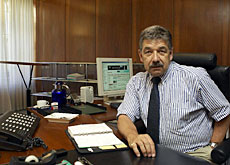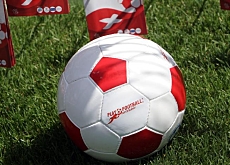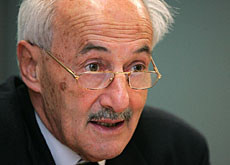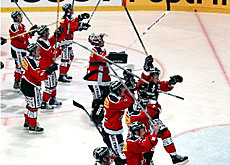Sporting success requires a team effort

Switzerland would benefit from staging more big sports events, the new president of the Swiss Olympic Association, Jörg Schild, tells swissinfo.
Schild said he saw his job as being to lobby for political and business backing.
He said that major events would be good for tourism and the economy, but these could not happen without financial and federal support.
Schild took over as head of Swiss Olympic on January 1.
swissinfo: You used to be a top handball player. What is your relationship to sport now?
Jörg Schild: I am a passionate supporter of FC Basel and the national football squad, and I enjoy skiing and playing golf. I’m not able to jog any more because playing handball on concrete surfaces damaged my joints.
swissinfo: The Winter Olympics are about to take place – in Turin, and not in the Swiss town of Sion, whose bid failed. Two other Swiss candidacies, by Bern and Zurich, also failed miserably. Is the hope over for Switzerland?
J.S.: No, it shouldn’t be. But since Sion, Swiss attempts to win the Olympics have been rather amateurish. If we want to attract big sports events to Switzerland we need nationwide agreement and the backing of political and business leaders. It is not enough to have just the support of a regional committee.
swissinfo: The importance of these big events is clearly underestimated. How do you plan to address that problem?
J.S.: Everyone celebrates when the Swiss national team wins a game. There is also national pride about major events such as the Lauberhorn downhill skiing race, the Swiss Indoors tennis championship and the Weltklasse athletics meet.
But to keep events like this going, we need the support of society and politicians. That’s what’s lacking. As the coordinator of Swiss sport, it is my job on the one hand to sell sport better, and on the other hand to do more lobbying.
swissinfo: The four cities and cantons hosting the Euro 2008 football championships in Switzerland don’t want to pay more towards the event after the cost estimate was revised upwards. How will you talk them round?
J.S.: It was clumsily done, the way the anticipated costs soared almost over night. But the problem can be worked out among ourselves, as has happened in Austria. Here we let everyone have his or her say, and that casts a bad light on sport in Switzerland.
swissinfo: Swiss Olympic and the Federal Sport Office are the top players in Swiss sport. How can we ensure they become a winning team?
J.S.: There has to be a clear separation of duties, avoiding duplication. But I don’t think it is just about those two bodies. In future Swiss sport will have four pillars: the federal authorities, Swiss Olympic, politics and business. If two of those pillars are missing we don’t stand a chance.
swissinfo: You are very well connected politically. What are your connections to the world of business?
J.S.: I spent almost 14 years in the Basel City cantonal government. And as the president of the conference of cantonal justice and police directors I had dealings with both the justice ministry and parliament. In these positions I made contacts with business leaders.
swissinfo: There are those who argue that instead of funding a wide range of sports, Switzerland should concentrate on the few sports where we have medal chances. Is that the way to success?
J.S.: I am completely against funding a wide range of sports. I have to sound out the sports federations about a new funding model. In some cases opinions are diametrically opposed. We have associations ranging from the football, ice hockey and ski federations to scouts. They all have their own demands.
swissinfo: Turning to the problem of hooliganism, should the anti-hooligan laws that have just been passed be extended beyond 2008?
J.S.: I regret that a small minority make such laws necessary. But they are necessary, also for the credibility of Swiss sport. I’d prefer the laws to be re-examined after the end of Euro 2008. If necessary they could then be further improved before being written into law.
swissinfo: The European football championships are the third-biggest sports event in the world. What impact will Euro 2008 have on Switzerland?
J.S.: A good result by the home team will increase interest in sport. It will also lead to a greater sense of our own worth. It has been shown over and over again that staging big events brings benefits for the host nation – for business, tourism, hotels, and shops. This gives a boost to industry. We have to look at the benefits instead of always complaining about the cost. If we do that we can expect to get something in return.
swissinfo-interview: Renat Künzi
Jörg Schild has been the president of Swiss Olympic since January 1, 2006.
He will continue serving as police director of canton Basel City until the end of March.
In his younger years Schild was one of the best handball players in the country; between 1967 and 1973 he was a member of the national side.
The Swiss Olympic Association is the umbrella organisation for Swiss sports.
It brings together 82 sports associations and 27,000 clubs.
These account for 3.2 million people in Switzerland.

In compliance with the JTI standards
More: SWI swissinfo.ch certified by the Journalism Trust Initiative



You can find an overview of ongoing debates with our journalists here . Please join us!
If you want to start a conversation about a topic raised in this article or want to report factual errors, email us at english@swissinfo.ch.